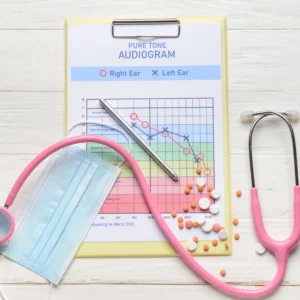The Process of a Hearing Evaluation: Finding Expert Care Nearby
Finding a local hearing evaluation near me is a crucial first step in the quest for auditory health. These evaluations are essential for identifying and managing hearing issues. Local hearing centers are pivotal in this journey, offering comprehensive assessments that pave the way for a clearer world of sound.
The Essential Role of Hearing Evaluations
Understanding the importance of hearing evaluations reveals why they’re more than just routine checks:
- Diagnosing Hearing Loss: A hearing evaluation accurately determines the type and severity of hearing loss.
- Uncovering Underlying Causes: Identifying the root causes of hearing issues is vital.
- Guiding Treatment Options: The insights from the evaluation inform the best course of treatment.
- Monitoring Hearing Health: They allow for tracking hearing changes over time.
- Enhancing Life Quality: Addressing hearing loss improves communication and active social participation.
The Power of Early Detection
Embracing early detection of hearing loss unlocks numerous benefits:
- Preserving Hearing: It’s critical in halting further auditory damage.
- Improving Speech Clarity: Early treatment significantly boosts speech comprehension.
- Boosting Social Engagement: It ensures active participation in social scenarios.
- Supporting Mental Health: Early action can prevent the isolation and depression linked to hearing loss.
Wondering if you need a hearing evaluation? Understand the signs of hearing loss in adults.
The Hearing Evaluation Process
When you search for a “hearing evaluation near me,” you’re stepping into a process designed to offer clarity and solutions. Here’s what to expect:
- Initial Consultation: Discussing your hearing history and lifestyle sets the stage for a tailored evaluation.
- Ear Examination: A close look inside your ears checks for blockages or abnormalities.
- Conducting Hearing Tests: Various tests will measure your auditory capabilities across different parameters.

Types of Hearing Tests Explored
Each test during the evaluation serves a unique purpose:
- Pure Tone Audiometry: This foundational test assesses your ability to hear varied frequencies.
- Tympanometry: It evaluates the health and function of the middle ear.
- Speech Audiometry: This goes beyond basic tests to assess speech understanding in noise.
- Comprehensive Assessments: Additional tests like bone conduction testing and ABR may be conducted to provide a thorough understanding.
Transitioning to Hearing Aid Evaluations
After a hearing test, you might proceed to a hearing aid evaluation, an essential step for those needing auditory assistance. Unlike general hearing tests that assess the extent and type of hearing loss, hearing aid evaluations dive deeper into finding a tailored solution for you.
What to Expect During a Hearing Aid Evaluation
- Personalized Consultation: This part of the evaluation focuses on understanding your daily life, activities, and the specific listening environments you find challenging. Your audiologist aims to grasp your needs thoroughly to recommend the most suitable hearing aids.

- Hearing Aid Selection: The audiologist will suggest various hearing aid models based on your hearing loss characteristics, lifestyle, and budget. This selection process involves discussing the features, styles, and technologies of different hearing aids that best match your requirements. If you have hearing aid insurance benefits, your hearing care provider will make sure that you get devices that work for your plan.
- Fitting and Programming: Once a hearing aid is selected, the audiologist will customize its settings to your hearing profile. Using real-ear measurement, they ensure the hearing aids provide the correct amplification for your hearing loss, ensuring maximum comfort and effectiveness.
- Trial Period: Many centers offer a trial period during which you can experience hearing aids in your everyday environment. This period is crucial for determining how well the aids help you in real-world situations and whether any adjustments are needed.
Dealing with tinnitus? Discover the best hearing aids for tinnitus.
Understanding the Importance of a Hearing Aid Evaluation
This evaluation is not just about choosing a device; it’s about enhancing your quality of life. Here are a few reasons why it’s so vital:
- Ensures a Perfect Match: Every person’s hearing loss and lifestyle are unique. A hearing aid evaluation ensures your chosen device aligns perfectly with your needs.
- Optimizes Hearing Aid Performance: The audiologist optimizes the hearing aid’s performance through detailed programming and adjustments, ensuring you receive the best possible support for your hearing loss.
- Education and Support: This process is also educational. It provides you with essential information on using and maintaining your hearing aids and what to expect as you adapt to them.
- Long-term Success: A thorough evaluation and follow-up care are key to the long-term success of your hearing aid use. It ensures you continue to receive the benefits and can address any changes in your hearing needs over time.
A hearing aid evaluation is a personalized journey to finding the right hearing aid to open up a new world of sound for you. It involves careful selection, fitting, and ongoing support to ensure that your hearing aids significantly improve your daily life and activities.
Seeking Out the Best Hearing Evaluations Near Me
Steps to Finding the Right Center:
- Research: Utilize online directories and insurance networks to compile a list of potential centers.
- Read Reviews: Online feedback can offer insights into the experiences of others.
- Make Inquiries: Contacting centers directly can provide a sense of their services and approach.
- Consultations: A visit can help you gauge the environment and professionalism of the staff.
The Advantage of Local Hearing Aid Evaluations
Opting for a local evaluation offers several key benefits:
- Tailored Care: Local centers often provide more personalized attention.
- Building Relationships: Developing a rapport with your audiologist enhances the care you receive.
- Expert Insights: Local specialists bring an understanding of community-specific auditory challenges.
- Convenience and Support: Proximity to a center facilitates easier follow-ups and adjustments.
Your Path to Auditory Health
Embarking on a hearing evaluation is a decisive step toward addressing hearing loss. By choosing a reputable local center, you gain access to personalized care tailored to your specific needs. This journey promises improved hearing and a richer, more connected experience of the world around you. Schedule with Stanford Hearing and take that crucial step toward enhanced auditory health and quality of life.
